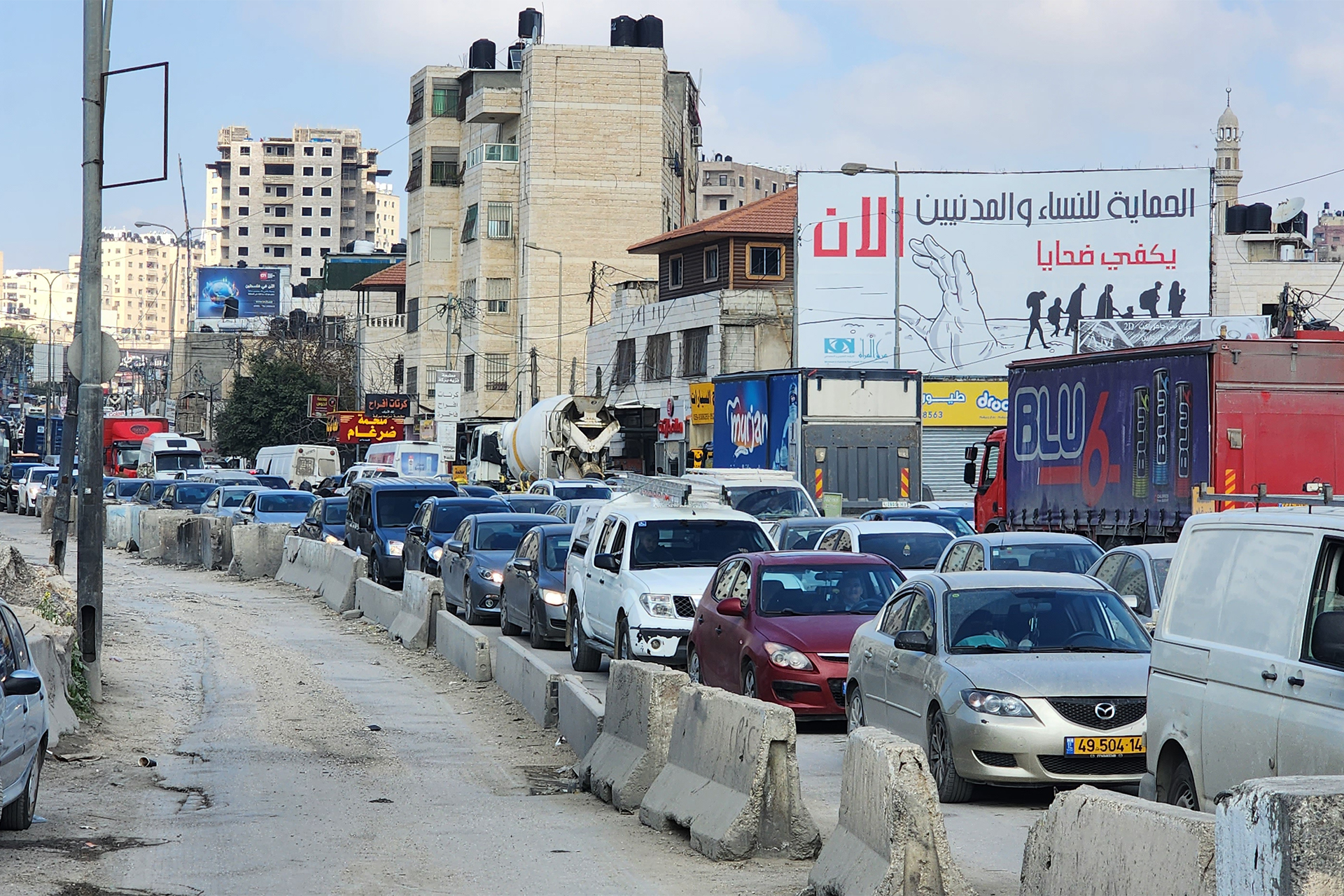Palestinian vehicles pile up on the main road between Ramallah and Jerusalem due to an Israeli checkpoint (Al Jazeera)
Ramallah -
Abdul Hadi Azzam spends hours every day at the Al-Murabba checkpoint, which was created by the Israeli occupation forces since the war on the Gaza Strip, and is located on the only bypass road used by Palestinians coming from the central and southern West Bank to its north, after the Huwwara checkpoint was completely closed.
Azzam - who works in the city of Nablus and lives in Ramallah - has become accustomed to delays at the checkpoint since then, but the days of Ramadan seemed more delayed, as the Israeli forces present at the checkpoint search all vehicles, in addition to the presence of an additional force a few meters after the checkpoint.
Azzam told Al Jazeera Net that he noticed - after crossing the checkpoint at the entrance to Nablus and until reaching the city of Ramallah - dozens of points where there are military vehicles on the outskirts of the main road, and there are many of them at the entrances to Palestinian communities and side streets that Palestinians use as alternative routes to roads. Which has been closed.
This military presence represents a practical embodiment of the occupation’s announcement, before the holy month of Ramadan, of its intention to deploy more forces in the West Bank, for fear of what it described as “the Palestinians carrying out terrorist operations during the month,” which was accompanied by frequent media talk in all Israeli media outlets, which began more than more than A month about the seriousness of (the situation in) Ramadan.
Car crisis at the Al-Murabbaa checkpoint established by the occupation forces on the main road between the north and south of the West Bank (Al-Jazeera)
Promotion of alert
The Israeli media reported the news that the army had deployed 23 units in the West Bank, and compared it with the presence of 12 units waging a war in the Gaza Strip, as evidence of the great fear in security circles that any operations would take place against Israeli targets during this month in the West Bank, specifically in the occupied city of Jerusalem. Israeli Channel 12 stated that “the number of police and security personnel deployed in the city of Jerusalem and the West Bank is unprecedented.”
Khaldoun Barghouti, a researcher in Israeli affairs and a follower of the Israeli media, says, “There is a systematic trend to portray Ramadan as the month of operations carried out by Palestinians against Israelis, by highlighting numbers and statistics of operations that occurred this month during previous years, and linking them this year with the war on Gaza.”
He added in his interview with Al Jazeera Net, "All these analyzes are presented without an objective context, and no reference to the reasons that push the Palestinians to do so, including occupation measures, restrictions, and arrests, in addition to the restrictions on Al-Aqsa Mosque and settler attacks."
According to Barghouti, the security authorities, and behind them the Israeli media, anticipated Ramadan by weeks to talk about warnings in all news bulletins and analytical programs, and allocate a specific time to talk about Ramadan, in addition to linking any event to it, as was the case after the shooting that occurred days before. Ramadan, near the Homesh settlement in the northern West Bank, during which 4 soldiers were injured.
These bulletins included a systematic injection of information about fears of escalation of events in the West Bank and increased operations, all of which was translated on the ground through the deployment of more forces, tightening procedures, and strengthening the occupation authority.
Israeli affairs researcher Khaldoun Barghouti: A systematic trend to portray Ramadan as a month of operations without an objective context (Al Jazeera)
Well thought out mechanism
This exaggeration was not the result of Ramadan this year. Over the past years, the idea of depicting this month in this way was escalated in a gradual and deliberate manner, by the Israeli security services and successive governments, which was accompanied by measures on the ground, restricting freedom of worship and movement at the level of the West Bank and Jerusalem.
“All of this falls within the Zionist vision of trying to strip the identity of the Holy City, which is evident in the month of Ramadan,” according to what Ibrahim Rabaya, managing editor of the “Palestinian Affairs” periodical issued by the Palestine Liberation Organization Research Center, says.
Rabaya added - in an interview with Al Jazeera Net - that this vision "took a new turn this year, by portraying the West Bank, including Jerusalem, as an area of tension capable of exploding at any moment, and therefore it must be treated security-wise like the Gaza Strip."
The same spokesman confirms that “this policy, which is not linked to any government alone, is an Israeli mechanism for passing security policies and imposing a fait accompli in the West Bank and Jerusalem, embodying an approach that was consolidated after October 7, and applied by the Israeli security authorities on the ground, that what did not come "Force comes with more force."
Source: Al Jazeera

